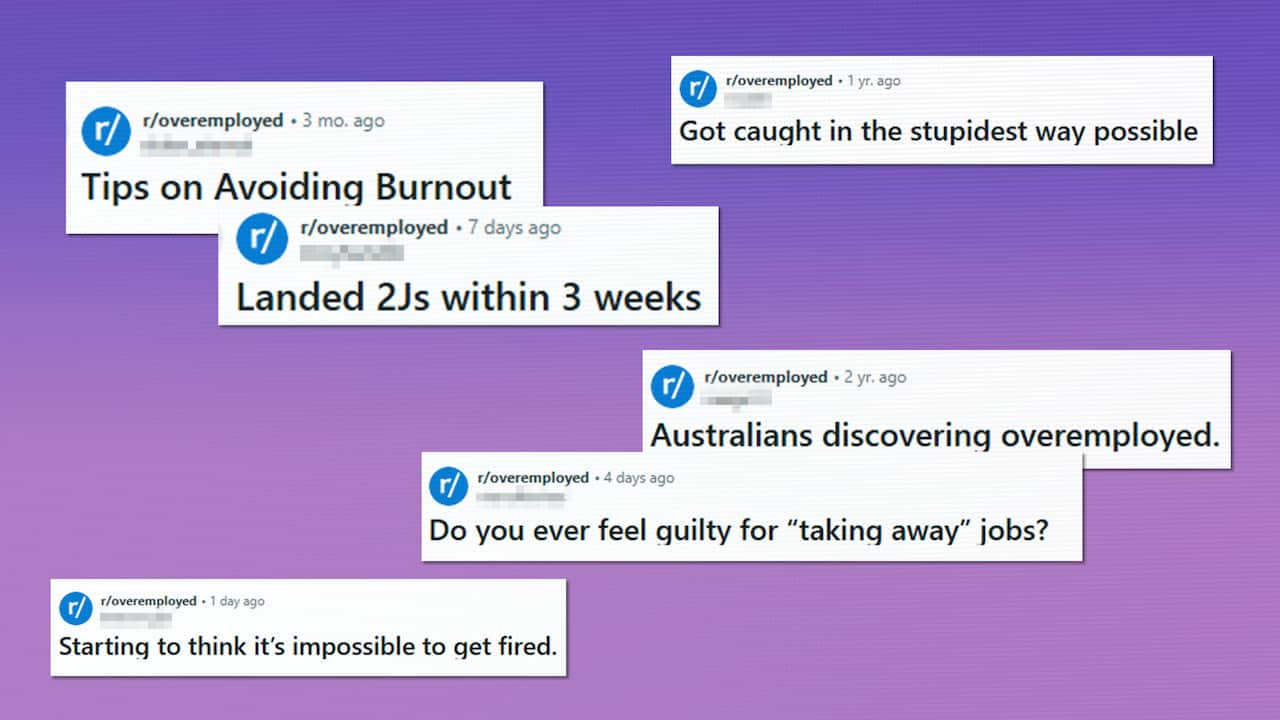“I always had a computer and a dongle, so I’d do my other meetings during lunchtime,” she said.
“There were points where I would not sleep, or I would do 48 hours in a row and then crash for seven hours,” Ash said.
It can be a lucrative business — Ash says she raked in $500,000 during her busiest year.
She isn’t alone. Ash is part of a growing international community of workers hoping to multiply their incomes by flying under the radar. No matter the risks.
‘Work multiple jobs, reach financial freedom’
Members — including Australians — swap career advice and tips to avoid getting caught. They also share experiences of burnout and getting sacked after their employers caught on.

More than half a million people have joined an online community discussing the ‘overemployed’ lifestyle. Source: SBS
Those who spoke to The Feed stressed they wanted their identities hidden, to avoid potential blowback from employers past and present.
One Australian, “Jess”, said they were an engineer who had previously doubled their income by juggling four full-time jobs. For them, it was about having extra money, and what they saw as rebelling against the system.
“They’re very nervous about employees doing other jobs because … they would think that would normally mean productivity on their first job declines,” he said.

Mark Wooden headed the The Household, Income and Labour Dynamics in Australia (HILDA) Survey for two decades. Source: Supplied
Jess believes traditional corporate ideals, such as loyalty to a single company, are outdated.
“I have done the two meetings at the same time before though … you’ve got one earpiece in just to listen, [then] the other one … It’s insane, I wouldn’t recommend it at all.”
‘Working three jobs to make ends meet’
He hopes this will be his ticket to owning a home in Sydney, where the median house price has jumped over $1.7 million, according to the latest Domain house price report.

More Australians than ever are working multiple jobs. Credit: Pexels / Peter Olexa
“I just don’t see any other way, other than working harder and earning more,” he said.
“I’ve been let go twice just before Christmas … and I can’t ever, ever put my family through that again.”
The health impacts of working long hours
“There’s a lot of literature linking longer work hours to poorer health outcomes.

Nicole Black said more people are taking on longer hours at work or multiple jobs due to the cost-of-living crisis. Source: Supplied
“Things like exercise, that takes time, cooking healthy meals, we know that takes time, so it’s going to impact other aspects of your life. Just the very fact that you’ve got 24 hours a day, if you’re spending more of that time working, you’ve got less time to spend being healthy.”
“It kind of burnt me out pretty badly and I’m not super keen to go back to it.”
“But if they say, ‘I’m working 75 hours a week and I wish I was only working 50’ … those people are much less happy with their jobs, more likely to report anxiety and symptoms of depression.”
Is it lawful to have multiple full-time jobs?
“If you get caught, but you can demonstrate that you didn’t lie and you have otherwise satisfied your obligations in the contract to deliver the work that you paid to do, it might be that you’ve got a case,” King said.

Employment lawyer Danny King says a lot of companies’ employment contracts stipulate that employees can only work for that company. Source: Supplied
Breaches of an employment contract could be considered misconduct, which could lead to a warning, discussion or termination of employment.
“I don’t think there’s anything ethically wrong with that. I just think people get all up in arms and clutch their pearls about this sort of thing, but I think employers have had their day.”
